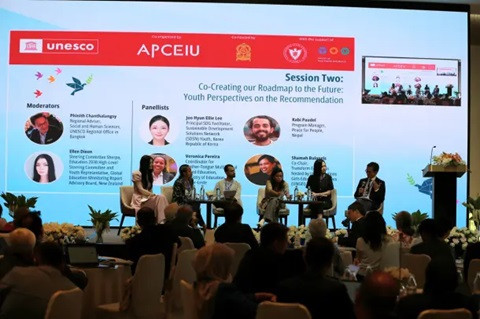
GCED Basic Search Form
Quick Search
Usted está aquí
Noticias

The SDG 4 Youth & Student Network highlighted youth's key role in shaping peace, human rights, and sustainable development.
8 August 2024
Youth and students from across the Asia-Pacific gathered in Bangkok as part of the ‘Regional Policy Dialogue and Launch of the “Recommendation on Education for Peace, Human Rights and Sustainable Development” in Asia-Pacific’, from 5 to 7 June 2024, in Bangkok. The Regional Policy Dialogue was supported organized in collaboration with the Centres of Asia-Pacific Excellence (CAPEs), the New Zealand Centre for Global Studies, and Sophia University, Japan. The event was co-hosted by Thailand’s Ministry of Education. Nearly 150 participants from over 20 countries across the Asia-Pacific region gathered in Bangkok for this pivotal, multi-sectoral event.
This youth event, ‘Co-Creating Our Roadmap to the Future: Youth Perspectives on the Recommendation’ provided a platform for young people to share their perspectives on sustainable development, peace education, gender equality, and digital literacy. Moderated by Phinith Chanthalangsy, Chief of the Social and Human Sciences Unit of the UNESCO Regional Office in Bangkok, and Ellen Dixon, of the SDG 4 Youth & Student Network, the event featured a panel comprising Joo Hyun Ellie Lee, of the Sustainable Devleopment Solutions Network (SDSN) Youth Korea; Kabi Paudel, of Peace for People, Nepal; Veronica Pereira, from the Ministry of Education of Timor-Leste; and Shamah Bulangis, of Transform Education, The Philippines.

Phinith Chanthalangsy (left) and Ellen Dixon (right)
UNESCO/J. Barallas
Ellen Dixon opened the session with a powerful statement on the importance of youth engagement in policy-making. She emphasized that youth involvement is important for realizing young peoples’ full potential and fundamental freedoms. ‘This is actually about freedom, young people’s freedom...Freedom is active, it is action’, Dixon remarked, setting a dynamic tone for the discussions that followed.
Sustainable Development
Joo Hyun Ellie Lee, of SDSN, underscored the need to broaden the focus of education for sustainable development (ESD) beyond environmental issues by incorporating the cognitive, social, and emotional growth of young people. ‘We need to enhance the collaboration among diverse stakeholders with youth organizations’, Lee stated, thus underscoring the importance of inclusive and comprehensive policies to support youth initiatives.

Joo Hyun Ellie Lee (left) and Kabi Paudel (right)
UNESCO/J. Barallas
Peace Education
Kabi Paudel, of Peace for People, shared the power of storytelling in early childhood education, and peace-building activities for youth in Nepal. He emphasized the importance of nonviolent dispute resolution coupled with community collaboration, thus fostering empathy and inclusivity among young people and encouraging them to become peace ambassadors. ‘By integrating peace education into our programme, we provide young people with the tools to understand and manage conflict, foster empathy, and promote inclusivity’, Paudel remarked.
Gender Equality
Shama Bulangis, of Transform Education, highlighted the pervasive issue of school-related gender-based violence, emphasizing its widespread impact on young women, girls, and LGBTQI learners. She revealed concerning statistics attesting to the severity of the problem, while stressing the importance of comprehensive sexuality education (CSE) as a vital tool to address and mitigate gender-based violence in schools. Advocating CSE’s implementation to foster healthier relationships and ensure safer educational environments for all students, Bulangis remarked, ‘If there are no reports in your school, it means your grievance mechanisms are not working.’

Shama Bulangis (left) and Veronica Pereira (right)
UNESCO/J. Barallas
Digital Literacy
Veronica Pereira emphasized the importance of respecting language, culture, and tradition in education. She highlighted the role of digital tools in enhancing educational access and pointed out significant challenges, such as the persistent need for greater digital literacy among teachers, coupled with poor internet connectivity in rural areas. Pereira stressed the need for comprehensive technology training for teachers and the provision of necessary digital resources to improve education quality. ‘A majority of teachers in Timor-Leste from grades K through 12 still lack knowledge in basic digital literacy’, Pereira noted, as she called for increased support and resources to bridge this gap. She also noted that using the mother tongue at school can preserve cultural identity and respect the origin of children. Pereira concluded by emphasizing the essential roles of digital tools and technology in modern education.
The session concluded with a Q&A segment, during which panelists and attendees discussed the practical steps needed to implement the Recommendation. Key takeaways included the importance of intergenerational dialogue, the role of non-traditional actors such as K-pop artists and social media influencers, and the centrality of youth voices and actions in policy-making.
The ‘Co-Creating’ youth session at the Regional Policy Dialogue highlighted the critical role of today’s youth and students in shaping the future of education in Asia-Pacific. Their insights and recommendations are proving essential for developing inclusive, sustainable, and effective educational policies.
Related Links
- Sustainable Development Solutions Network (SDSN) Youth Korea
- Peace for People
- Transform Education
- Ministry of Education Timor-Leste
- Youth Declaration on Transforming Education
About SDG 4 Youth & Student Network
Youth and students are key to achieving Sustainable Development Goal 4 (SDG 4) for an inclusive and equitable quality education. The Asia-Pacific region, with the largest percentage of young people globally, has a pivotal role in this endeavor. The SDG 4 Youth & Student Network amplifies the voices of young people in global and regional advocacy and policy engagement. The platform brings together young activists, advocates, and leaders who champion the Youth Declaration on Transforming Education, first put forth at the UN Secretary General’s Transforming Education Summit (TES), of 2022.
